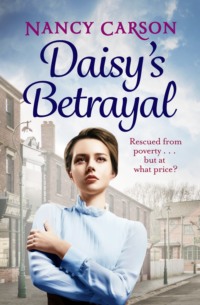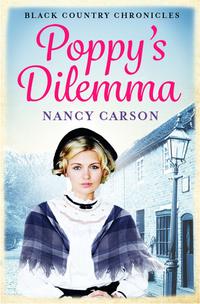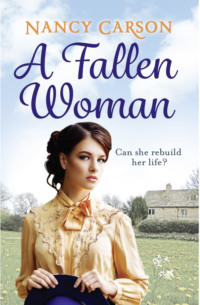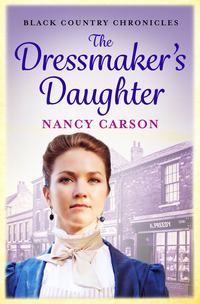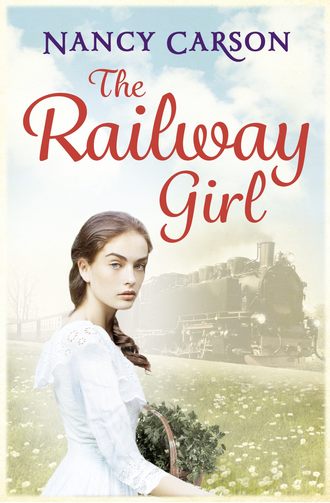
Полная версия
The Railway Girl
‘What’s your name?’ he managed to ask. ‘I ain’t seen you in here before.’
‘Lucy,’ she said.
‘You live local?’
‘Bull Street.’
‘Funny I’ve never seen you before.’ Arthur was trying manfully to maintain a look of normality.
‘Why, where do you live?’ Lucy asked pleasantly.
‘The Delph.’
‘Fancy. Just up the road.’
Arthur was effecting some severe internal abdominal contortions coupled with heroic buttock clenching, in an effort to maintain not only his composure, but his self respect and his eternal reputation. He was desperate to keep the girl talking as long as he could, to try and find out more about her, but he was even more desperate to win the battle against his wayward bowels. It was a battle he was losing ignominiously, however, for without doubt he had to go.
‘Yes, just up the road … You’ll have to excuse me, Lucy …’ He turned and fled.
‘What’s up with him?’ Lucy enquired of James.
‘Something he ate, I think,’ James replied, being as discreet as he knew how. ‘He’s had a problem all day, I believe.’
Lucy chuckled. ‘Poor chap. Well, he’ll find nowhere to relieve himself that way.’
Chapter 3
Sunday was another lovely September day, a day when women kept open their front doors and sat on their front steps, gossiping with like-minded neighbours. They peeled potatoes and shelled peas which they would have with a morsel of meat for their dinners when their menfolk staggered back from the beer houses. Lucy strolled to the water pump carrying a pail. Bobby the sheepdog ambled wearily but proprietorially beside her, ignoring other animals that pointed their snouts at him and sniffed. Lucy tarried a minute or two with most of the women, pleased to comment on what beautiful weather they were blessed with, but said nothing of the dismal slag heaps and factory yards that rendered the immediate landscape squalid and colourless.
‘It’s a pity there ain’t no fine houses with well-tended gardens in this part of Silver End,’ she commented to one woman known as Mother Cope, who was smoking a clay pipe as she tearfully skinned onions in her lap. ‘’Cause the flowers, specially the roses, would still be in full bloom, and a sight to behold on a day like this.’
‘If you want to see flowers, my wench,’ Mother Cope replied, withdrawing her pipe from between her toothless gums, ‘I daresay as there’s a bunch or two in the churchyard you could gaze at, on the graves o’ the well-to-do.’
Lucy returned to the house with her pail full of water and poured some into a bowl to give to Bobby, before using more to boil vegetables. At about three o’ clock her father returned hungry from the Whimsey and the three sat down to their dinner.
‘I reckon Ben Elwell could’ve done with your help again this morning, wench,’ Haden remarked to his daughter.
‘I’ve got too much to do here helping Mother of a Sunday,’ Lucy answered. ‘But he’s asked me to work tonight.’
‘Ar, well, there’ll be some beer shifted tonight an’ all, if the weather stops like this. Folk like to tek their beer into the fresh air and watch the world go by.’
‘I only wish they’d bring back their beer mugs when they’ve done, instead of leaving them lying around for me to collect.’
‘I reckon you’ve took to this public house working a treat, our Lucy,’ Haden said with a fatherly grin. ‘Her’s took to this public house working, you know, Hannah. Who’d have thought it, eh?’
‘Just as long as she keeps away from all them rough toe rags,’ Hannah replied.
‘Oh, they ain’t all rough, Mother. There’s a lot of decent, respectable men that come in for a drink. One or two even buy me a drink now and again.’
‘As long as nobody expects any favours in return.’
She felt like saying that if there was somebody she liked the look of she might be tempted, but kept it to herself. ‘D’you know anybody who lives down the Delph, Father?’
‘The Delph? Why?’
‘I just wondered. Somebody came in last night who I’d never seen before in me life, and he said he only lived down the Delph. You’d think you’d know everybody who lived close by. That’s all. This chap was with a crowd that played cricket for the church, so Mrs Elwell said.’
‘Lord knows who that might be. Fancy him, do yer?’ Haden winked at Hannah.
‘Not particularly,’ Lucy protested. ‘I only said it ’cause I think it’s weird not ever knowing somebody, even by sight, who lives so close to us.’
As Sunday progressed Arthur Goodrich’s self-willed bowels seemed to settle down. He attended matins at St Michael’s during the morning with his mother, and they circumspectly sat in a pew at the back, lest he should have to dart out during the service. Mercifully, he was untroubled by any such need.
His brother Talbot came for tea with Magnolia and their small son Albert. The extended family, Jeremiah included, once more crossed the threshold of St Michael’s for evensong. It was dark but warm when they finally emerged into the open air, and bats flitted in whispers between the tree tops overhead. Dinah and Jeremiah stopped to chat with some of the other parishioners by the light of a solitary gas lamp that hung over the main door, while the vicar, the Reverend Ephraim Wheeler, bid everybody a good evening with a shake of the hand and a benign smile, and looked forward to seeing them again next Sunday.
‘I’m going for a drink afore we go home,’ Talbot declared to Magnolia who was holding young Albert’s hand as the lad stood beside her. ‘I’ll see you back at Mother’s. Are you coming with me, our Arthur?’
‘I think I got the piles,’ Arthur answered ruefully. ‘Me backside’s that sore.’
Talbot rolled his eyes. ‘It’s because of the squits, Arthur. What ailments shall you be sporting tomorrow, I wonder?’
‘It’s your liver,’ Magnolia stated sagely to her brother-in-law. ‘It’s what comes of eating kickshaws and other such muck. See as your mother gives you a dose of dandelion tea or summat. Or soda and nitre’s good for you every now and again. That’ll sort yer. It’ll help to keep your system cool.’
‘Me system’s already cool,’ Arthur replied morosely. ‘That’s the trouble. It’s working in draughty graveyards what does it. How can you keep in good humours if you’m always cutting and blacking letters in draughty graveyards, sitting on cold graves? I wonder I don’t get pneumonia in me backside.’
‘You can’t get pneumonia in your backside,’ Magnolia asserted.
‘I can in mine. I’m forever catching a chill.’
‘Is that what I can hear wheezing sometimes?’ Talbot said with a grin.
‘Oh, it’s all right for you to mock, Talbot, stuck in a warm workshop.’
‘Somebody has to do the work in graveyards, amending and adding inscriptions and what not,’ Talbot replied. ‘Anyway, it’s skilled work.’
‘You wouldn’t know it from the wages. Anyway, I don’t see you doing it very often. You’re always in the workshop.’
‘Designing and carving gravestones, me, polishing slate and marble …’
‘It’s always me what has to go to these terrible places.’ He gestured with his hand to encompass in a frustrated sweep the very graveyard that now surrounded them.
‘Count your blessings, our Arthur. At least you ain’t got father around you when you’re out and about. But if you’re dissatisfied, have a word with the old sod. Maybe he’ll smile benignly upon you and start an apprentice who can do all them jobs.’
‘Him? Smile? Benignly?’ Arthur scoffed. ‘Anyway, apprentices take time to learn. Years. And they cost money. That miserable old bugger won’t spend any money, he’s too tight-fisted. No, I ain’t very pleased, Talbot.’
‘Well, I’m off for a drink. It’s up to you whether you come or not. But a drink might sweeten you up a bit.’
Then Arthur remembered the girl with the blue eyes who had said her name was Lucy, and he suddenly brightened up. ‘Why don’t we go to the Whimsey? I went there last night with the lads from the cricket team. They keep a good drop o’ beer. And it’s on the way home.’
‘All right, we’ll go to the Whimsey. I’ll ask Father if he wants to come.’
‘No, leave him be,’ Arthur said, not relishing the prospect of his father’s company. ‘Let him go home. I don’t want him around me.’
‘But you can ask him about keeping you away from churchyards.’
‘It won’t make any odds.’
‘Maybe not, but we can’t not ask him to come.’
‘Oh, all right then.’
So Jeremiah joined his two sons.
Outside the Whimsey men were standing in groups, some leaning against the bay windows either side of the door, while some were squatting on the kerb. All were drinking, taking advantage of the evening warmth of an unexpected Indian summer.
‘Shall we drink outside?’ Talbot enquired.
‘I’d rather go inside, in the saloon bar,’ Arthur said decisively, driven by the possibility of seeing this Lucy again. ‘I’ll get the beer.’
He made his way through the small but crowded taproom towards the counter and waited his turn to be served. An older woman, presumably the landlord’s wife, was supping from a crock and serving drinks alongside Lucy. He watched them, trying to decide which one would get to him first, trying to catch Lucy’s eye. When she saw him she smiled reservedly, and asked to serve him, making his insides flutter ominously once more.
‘Oh, it’s you,’ she said, pleasantly surprised. ‘You took off a bit quick last night. Are you all right now?’
Arthur grinned sheepishly. ‘A lot better, thanks.’ He was tempted to mention his suspected piles; it might elicit some sympathy. But he didn’t know this girl well enough, and piles were a bit personal and private to talk about when you didn’t know somebody well … and might easily put them off. ‘Three pints please, Lucy.’
‘Fancy you remembering my name,’ she said amenably, grabbing three tankards. She began to fill them from a barrel behind her. ‘Are your trousers dry now?’ she asked over her shoulder.
‘Yes, thanks.’
‘That’s good,’ she said, then placed the beers on the counter.
He handed her a shilling. ‘Oh, and have a drink yourself.’
‘That’s decent of you. Thank you.’ She handed him his change and he relished the brief moment when the tips of her slender fingers brushed his palm. ‘Are you here with your mates again?’
‘No, my brother and my father this time,’ he replied, passing two foaming tankards to Talbot. ‘We’ve just come from church. D’you go to church, Lucy?’
‘Me? Not since my sister got wed at the Baptist chapel. No, I haven’t got time for church. My mother goes regular though. To the Baptist chapel …’ She turned to her next customer and began serving him.
But Arthur remained where he was, hoping to be blessed with some more conversation with this girl who appealed so much.
‘Is that your brother?’ she asked, evidently content to continue talking to him while he tarried, to his delighted surprise.
‘Yes. His name’s Talbot. And that’s my father with him.’
‘I’ve seen them about. Funny as I hadn’t seen you till last night. Then I see you two nights running.’
‘I know,’ Arthur replied with a grin, his confidence growing, for this girl seemed easy to talk to, and not like the others. ‘It’s a funny coincidence, don’t you think?’
She handed her latest customer his beer and took his money, still looking at Arthur. ‘I bet my dad knows yours.’
‘Oh? How’s that, then?’
‘He says he knows most folk round here. What’s your name?’
‘Arthur Goodrich. I’m a stonemason. The old man’s Jeremiah. So who’s your father?’
‘Haden Piddock. He works at the Earl’s. He’ll be here soon. He generally comes for his beer about this time.’
‘Maybe I’ll recognise him. Does he go to church or chapel?’
The notion evidently amused her, for she laughed. ‘My father? This place is his church … and his chapel.’
Arthur felt a tap on his shoulder. It was Talbot. ‘Is she the reason you wanted to come here for a drink? The doxy?’
Arthur grinned sheepishly. ‘She seems a decent wench.’
‘Her’s got long eyelashes, I’ll grant yer,’ Jeremiah remarked scornfully. ‘But I’ll tell yer this … As long as her can work, cook and bear babbies, the length of her eyelashes is of no consequence. Anyroad, her’s Haden Piddock’s youngest, unless I’m very much mistook.’
Arthur stepped back from the counter. ‘You know Haden Piddock?’
‘Oh, I know him all right.’ Arthur noticed with awful disappointment the scorn in his father’s tone.
‘Well, I don’t know Haden Piddock myself, Father, but his daughter seems a fine young woman.’ He slurped his beer and avoided his father’s look of disdain. ‘And I ain’t getting mixed up in some ancient feud you might have had with him.’
‘Got your eye on her, have yer?’
‘I might have. What’s it matter to you?’
‘Well, if you tek my advice you’ll keep well clear of anything to do with Haden Piddock.’
‘I was telling Father how you fancy a change from working in graveyards all the time, Arthur,’ Talbot said, discreetly switching the topic.
‘And I don’t know what you expect me to do about it,’ Jeremiah said testily. ‘Somebody has to do the stones in churchyards. We’d be better off employing somebody to work the forge and sharpen chisels. A handyman. But even a handyman will cost money and bring nothing in return.’
Arthur glanced back at Lucy, sorry that he had been dragged away from her, even more sorry that his father evidently didn’t think much of hers.
‘Did you hear what I said, Arthur?’
‘I did, Father,’ he said, turning his attention back to the old man. ‘But I’d rather you employed another stonemason. It’s bad enough in the summer with all the rain we get, but in the winter I might as well be a snowman. I’d rather work in the workshop. If you started another stonemason, I could.’
‘And where am I gunna get another skilled stonemason in Brierley Hill?’
‘Advertise,’ Arthur suggested logically. ‘There’s bound to be somebody in Stourbridge or Dudley. Or even Kingswinford. But you’d have to pay him more than you pay me.’
‘I got no sympathy with yer,’ Jeremiah claimed. ‘Respect is better than remuneration.’
‘Well, I don’t think so. Give me remuneration any day of the week. The respect will follow.’
‘Listen to yer. Talking damned rubbish. We’ve all had to work in churchyards at some time, and it’s done we no harm.’ He coughed violently as if to disprove his own theory. ‘And it’ll do you none neither. You’ll have to grin and bear it, our Arthur.’
Jeremiah turned to speak with another man he knew and his two sons drained their tankards.
‘I hate him,’ Arthur said venomously. ‘Cantankerous old bugger.’
‘Let’s have another drink,’ Talbot suggested. ‘It’s my turn.’
‘Give me the money and I’ll get ’em. I want another word with that Lucy Piddock.’
Talbot gave him a knowing look. ‘You heard what Father said.’
‘Sod him. I got no beef against this Haden Piddock, and I certainly ain’t got no beef against his daughter. So why should I be obliged to uphold his petty prejudices? He evidently isn’t about to do anything to help me. No, Talbot, I see a fine wench there, and if she’s free of any attachment I might just try my luck.’
Talbot smiled matily and winked. ‘Go on then, our Arthur, and I hope she’s worth it.’
So Arthur approached the counter again. As soon as she was free, Lucy stood before him and looked into his eyes with a friendly smile.
‘Same again?’
‘Please, Lucy.’ He leaned towards her. ‘Can I ask you something?’
‘Go on.’
‘Are you courting or anything?’ His heart was in his mouth, eager for her reply and yet dreading it.
Lucy smiled coyly and even by the dim lights of the oil lamps he perceived her blushing. ‘No, I’m not a-courting anybody.’
‘In that case, would you like to come out with me sometime?’
‘If you like.’
Arthur felt a boyish gush of excitement, a whole gallon of joy, surge through him. ‘Honest?’
‘I just said so, didn’t I?’
‘When? What night don’t you work in here?’
‘Tomorrow?’
‘Tomorrow then. About eight o’ clock on the corner of Church Street and the Delph?
‘Can we say half past seven? It’ll be dark by eight and my mother won’t want me to go off in the dark on me own, specially round here.’
He smiled. ‘All right. Half past seven … Listen, I could walk you back tonight if you want.’
‘No, it’s all right. Me dad’ll walk me back. He’ll be here soon. He would’ve been here sooner but he fell asleep after his dinner and I reckon he hasn’t woke up yet.’
‘If he don’t come, just give me the nod, eh?’ Arthur responded gallantly.
A consignment of port decanters had been carefully packed with straw and laid in a wooden crate, which Lucy Piddock and her workmate Eliza Gallimore had been filling during Monday afternoon. Now, at last, it was time to go home. Lucy stood erect and placed her hands in the small of her back. She stretched to counter the effects of so much bending, then unfastened the pinafore she wore to protect her skirt and blouse which had been clean on that morning. In the high rafters of the glassworks’ packing room two sparrows were squawking as they flitted from beam to beam in their squabble over a strip of bacon rind that one had picked up in the dusty yard outside.
The foreman, Job Grinsell, appeared. Job was a middle-aged man with a fatherly regard for Lucy.
‘I see as you’ve finished that crate what’s bound for Philadelphia,’ he commented and peered inside it, cursorily checking it for any loose items.
‘It’s all counted and packed tight,’ Eliza affirmed. ‘I bet you’m dying to nail the top on for us, eh, Job? Lucy and me am going home now, ain’t we Lucy? We’ve done our stint.’
Lucy picked up her cotton shawl from the hook on the whitewashed wall where she kept it and slung it loosely about her shoulders, ready to leave.
‘Just steady the lid for me then, one of yer,’ Job requested, ‘and I’ll do it for thee.’
‘Sod off. It’s past our knocking-off time. And Lucy ain’t got time to hang about. She’s got to pretty herself up. She’s seeing a fresh chap tonight, ain’t yer, Lucy?’
Lucy nodded.
Job looked at her intently. ‘Hey, well, mind what yo’m up to.’
‘You sound like my father,’ Lucy said, and compliantly held the wooden lid in place while Job took a handful of nails and a hammer and fixed it onto the crate.
‘I got daughters o’ me own, my wench. I know what a worry daughters am.’
‘Well, you need have no fears about me, nor the chap I’m a-meeting.’
Job guffawed derisively. ‘And if I believed that I’d believe anything. I tell yer – watch what you’m up to. Just watch his hands.’
‘Yes, sir,’ she answered with a mock curtsey.
The weather that early evening was a delight. The sun shone with a rich yellow warmth as Lucy stepped into it from the dankness of the packing room and headed for home. She always walked to and from the factory by way of the railway line; it was much quicker than going the semi-circular route up North Street and down Church Street.
She pondered this Arthur Goodrich. They had spoken no more than a couple of dozen words to each other and she felt no particular excitement at the prospect of meeting him later. She didn’t know quite what to make of him. The only reason she’d agreed to meet him was because it would actually be a bit of a novelty and a change from being stuck in the house with her mother.
She wondered what she could possibly have said to Arthur that prompted him to ask her out. If she had set his heart aflame she had done it unwittingly, but he’d not had the same effect on her – and she doubted that he ever would. Lucy wanted somebody to sweep her off her feet. She needed somebody she could fall hopelessly in love with, and Arthur was not the man. Oh, he seemed decent enough and even polite, but distinctly lacking in sparkle. She was certain she would have no competition from any other girl. Indeed, she would never be interested enough in him to worry about competition, he was so obviously anything but a ladies’ man. Anyhow, she was sure he would treat her with respect, for he gave her the impression that he was a gentle person.
A train was coming up the line, huffing and volleying clouds of white steam and black smoke. Lucy stopped and stood still until it had passed, as close to the edge of the cutting as she could get. She fixed her eyes on the guards’ van, just in case that man was working on it who she’d taken a shine to on the journey back from Dudley weeks ago. But he was not, and she sighed. She would love to see him again, but it was as if he’d disappeared off the face of the earth. Maybe he was just a figment of her imagination after all. Maybe she’d merely dreamed about him and he didn’t actually exist. As she continued walking she was beginning to wonder.
Her thoughts reverted to this insipid character Arthur and what reason she should give her mother and father for wanting to go out. Where would he take her? What should she do if he wanted to kiss her?
At last she reached the bridge over the railway at Bull Street. She clambered up the steep embankment and emerged onto the street, where she met Miriam Watson returning home from the firebrick works. They stopped to chat.
‘I’m seeing somebody tonight, Miriam,’ Lucy said, but there was no light of eager anticipation in her eyes. ‘Somebody who came in the Whimsey on Saturday and Sunday night.’
Miriam grinned her approval. ‘At last a chap. And is he handsome?’
Lucy shrugged. ‘Not particularly, but he’s better than nothing. He’ll do till somebody handsome comes along.’
‘Always supposing he wants to see you again after tonight, eh, Luce? You shouldn’t take things for granted.’
‘That’s true.’ She shrugged. ‘Not with my luck. Maybe I won’t suit him anyway.’
‘Who is he? What’s he do for a living?’
‘He’s a stonemason, named Arthur Goodrich. Me father says his family are well-to-do, but they’re not rich or anything. Just regular churchgoers.’
‘Oh, Lord!’ Miriam rolled her eyes. ‘You don’t want anybody spouting religion at yer, Luce. If he starts that I should give him the elbow quick. He ain’t a Methodist, is he?’
‘No, church. He goes to St Michael’s.’
‘And what’s he look like, this chap?’
‘A bit ordinary. He seems to have some quaint ways about him as well, what I’ve seen of him so far. But he seems decent enough. He was wearing a nice clean collar on his shirt. At least he ain’t rough.’
‘Well, you don’t have to stick with him if you ain’t that fussed. But you did say as you’d go out with the first chap what asked you, even if he was “the ugliest sod on earth”, you said. Remember?’
Lucy laughed. ‘I know I did, but he ain’t that bad, thank God. At least I won’t be ashamed if somebody sees me with him. It’s just that I don’t think it’ll amount to much. I just don’t fancy him.’
‘Well, next time I see yer, don’t forget to tell me how you got on, eh?’
‘I won’t. Anyway, I’d better go. Me belly’s rumbling for want of something to eat.’
Chapter 4
Arthur was particular about punctuality, but then he had a reliable watch in his fob pocket to assist him. Lucy, however, possessed no such device, and she was ten minutes late. Dusk was upon Brierley Hill and the sun, about to dip below the distant Shropshire hills, had daubed the western sky with intermingling hues of red, purple and gold that reflected in Lucy’s eyes, setting them aflame. Arthur was moved by the effect. The air was mild, and the musky, smutsy smell of industry encompassed them, but was barely noticed.
‘Have you been waiting long?’ she asked, an apology in her tone.
‘Only a minute or two,’ he replied with easy forgiveness. He smiled, happy and relieved that she had turned up at all, for he had set much store by this tryst.
‘Where are you taking me?’


